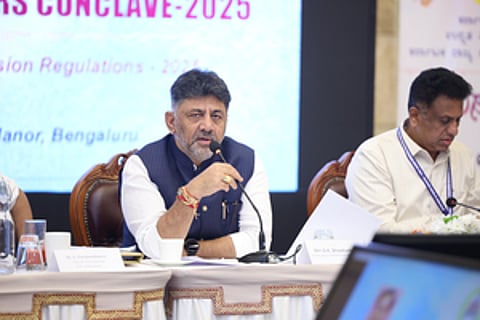

Higher education ministers of six states are demanding the withdrawal of the University Grants Commission’ recently released draft rules for appointments to teaching and non-teaching staff in universities and colleges.
The demand was made unanimously by the ministers of the states during a conclave organised in Bengaluru on Wednesday, February 3, by the Karnataka government.
Higher education ministers from Kerala, Himachal Pradesh, Telangana, Tamil Nadu, Karnataka and Jharkhand discussed the draft rules relating to Minimum Qualifications for Appointment and Promotion of Teachers and Academic Staff in Universities and Colleges, and Measures for Maintenance of Standards in Higher Education Regulations 2025.
They criticised the rules as impinging on federalism and the autonomy of higher education, and demanded more freedom for the states in appointments for academic roles.
The demands made by the conclave included a greater say say for states in the appointment of vice-chancellors of state universities, withdrawal of the provision to appoint non-academics as VCs, re-evaluation of the non-requirement of basic degree in core subject and other criteria in appointments of assistant professors, tenure and eligibility criteria for the appointment of VCs, the excessive and undemocratic nature of penalties for violating UGC guidelines, and mandatory entrance exam for undergraduate courses were among the the key points that were discussed during the conclave.
Karnataka Deputy Chief Minister DK Shivakumar who inaugurated the conclave, said that everyone must come together over the “flawed” National Education Policy (NEP) 2020 and put pressure on the Union government and the University Grants Commission (UGC) so that it is repealed.
He added that the NEP 2020 implemented by the Union government has several shortcomings, adding that the Karnataka government has taken bold steps to make certain amendments to it.
“The discussions and conclusions from this conference must reach the Union government. The standard of education in South Indian states, including Karnataka, is excellent. We are also at the forefront of providing educational facilities. I recall that even 30 years ago, students from North India migrated to South Indian states for quality education,” he said.
The Deputy Chief Minister added that Karnataka has over 70 medical colleges and more than 250 engineering colleges while Tamil Nadu, Kerala, Telangana, and Andhra Pradesh also have a significant number of colleges.
“However, the major concern is that we are unable to take our education policies to the national and international levels. Our democratic system is unique. Our Constitution grants us various rights. We have linguistic diversity as well. Competing at the state level is not beneficial; instead, we must compete on a global scale. That is why we all need to come together and reform the system,” he said.
He added that Bengaluru, Chennai, and Hyderabad are leading in producing technological experts, adding that no other region can match the capabilities of South Indian states.
“Our states have unique strengths, making them ideal for studying, working, and thriving. Our past leaders laid a strong foundation for quality education, and we must preserve it. India has made remarkable progress in the field of education,” he said.
The Deputy Chief Minister said that he along with the state Home Minister G Parameshwara own educational institutions. “We have experience in this field and understand its needs. We are also aware of the challenges it faces,” he said.
The Deputy Chief Minister added that Maharashtra has a unique model for higher education compared to Karnataka and Telangana, adding that in many states when different political parties are in power at the central and state levels, decision-making regarding vice-chancellors and university administration becomes challenging.